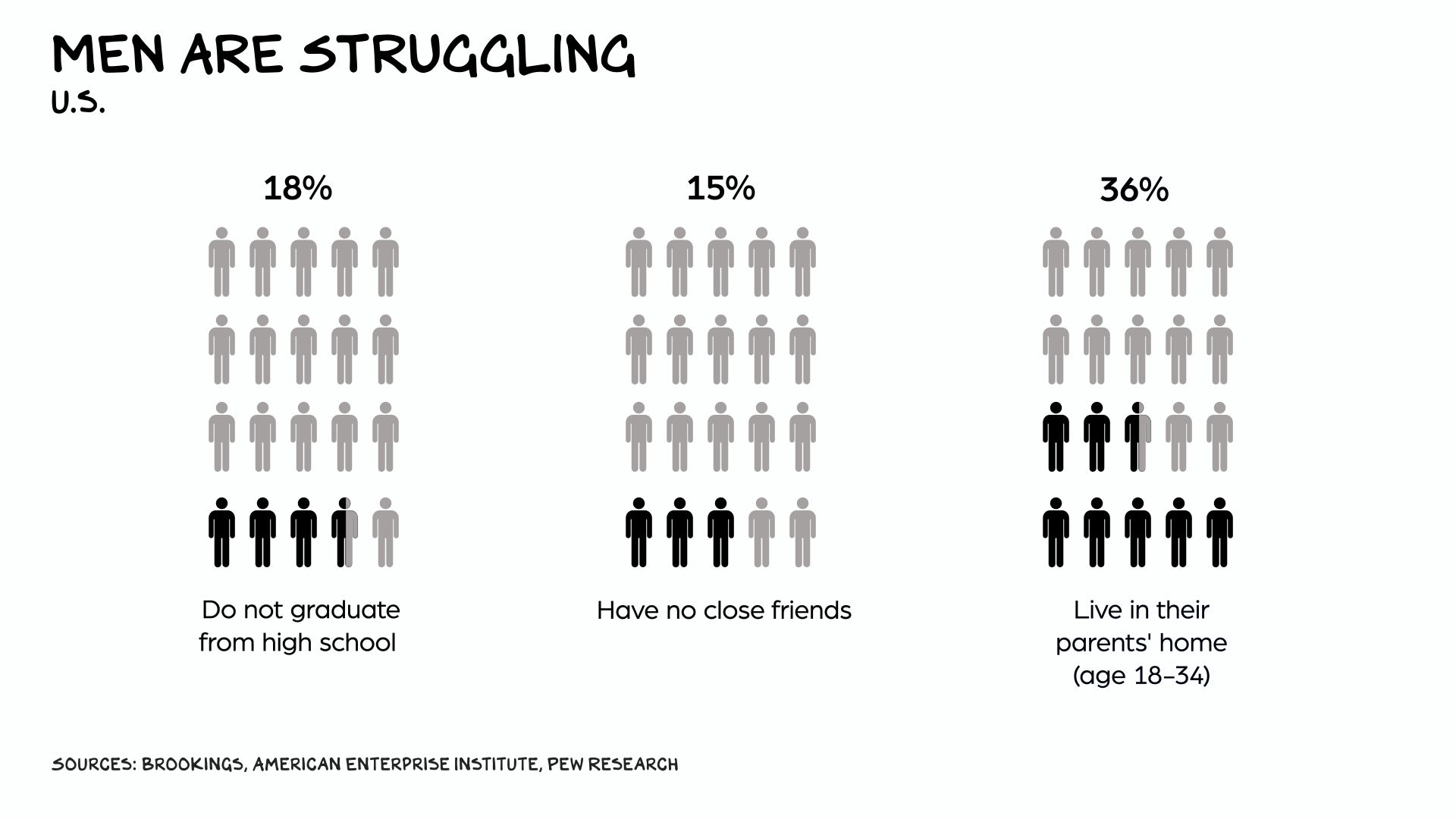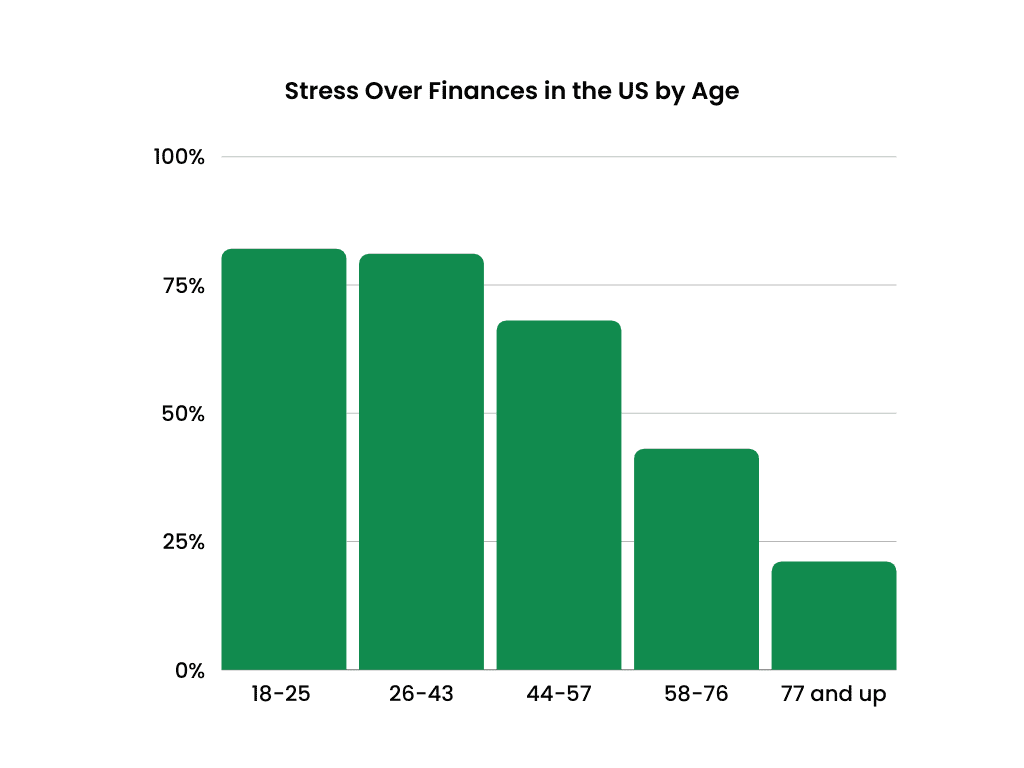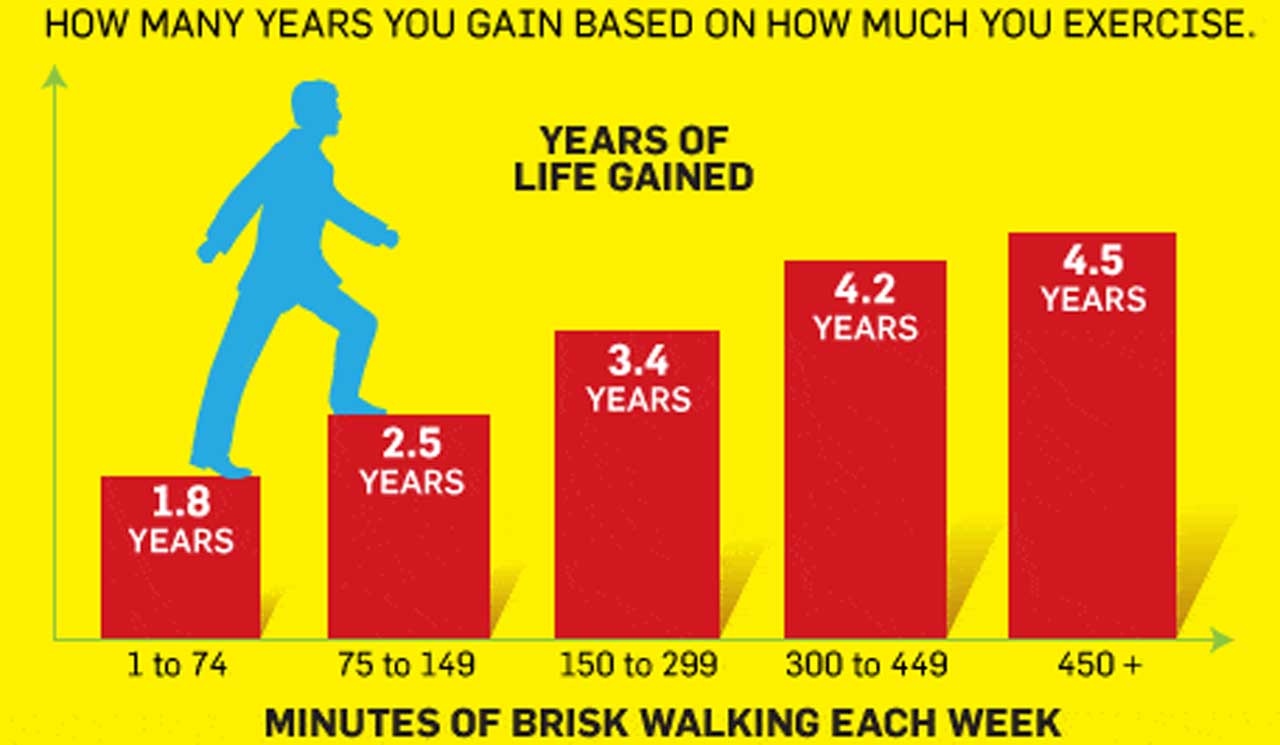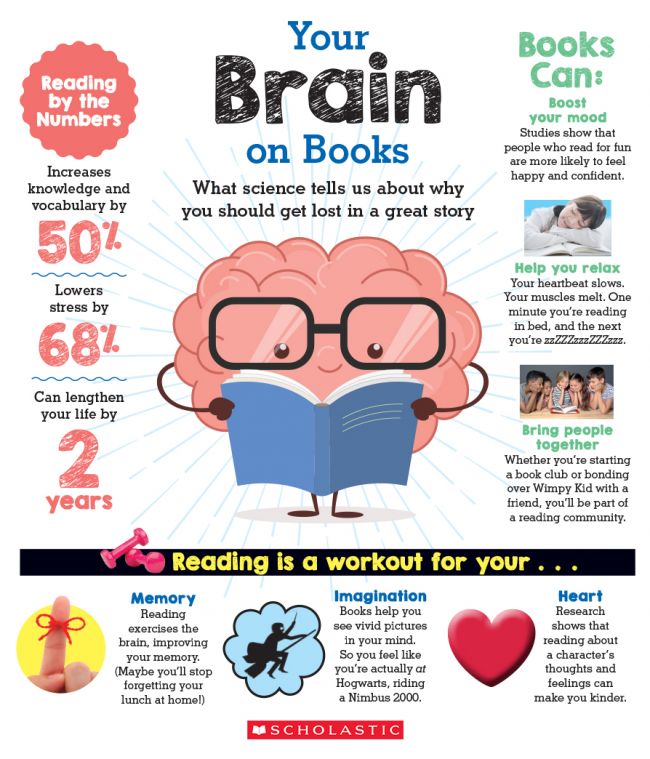
Menu

Young men are struggling. In fact, 15% have no close friends and 35% up to the age of 34 still live with their parents. If this feels familiar, don’t worry. You’re in the right place.

To help you become the best man possible and transform your life, I’m covering good habits for young men. Now, why focus on this, you ask? Well, because the habits we build when we’re young can seriously shape our future. They’re like the building blocks for the life we’re gonna live. And for young men stepping into adulthood, getting these habits right can make all the difference.
Imagine this: You’re crafting a version of yourself that’s healthier, smarter, and ready to tackle whatever life throws at you. Sounds good, right? That’s exactly what we’re aiming for. Whether it’s managing your time like a pro, getting your finances straight, or just taking better care of your mind and body, these habits are your toolkit for success.
So, whether you’re looking to upgrade your life game or just curious about what habits to focus on, you’re in the right place. I’m about to unpack 10 essential habits for men that can transform not just your
Let’s go!
Think of habits as your brain’s own shortcuts. You know, like those quick keys you use on your keyboard. But instead of CTRL+C for copy, it’s like “CTRL+D” for discipline, or “CTRL+H” for health. Your brain loves efficiency, and once it realizes doing something over and over is good for you, it starts to do it automatically. That’s a habit for you.
Now, why bother with good habits? Here’s the kicker: good habits can literally transform your life. They’re the difference between feeling okay and feeling amazing. Between just getting by and absolutely crushing it. And the best part? Once a habit is in place, it takes way less effort to keep it going.
Imagine setting up a line of dominoes. The hard part is setting them up, right? But once you flick the first one, they all fall down smoothly. That’s how habits work. You put in the upfront effort, and then it’s like your life starts to fall into place, one domino at a time.
So, whether it’s making your bed every morning, planning your day the night before, or setting aside time to read, each good habit you build is like adding another domino. And pretty soon, you’ve got a whole line of them, ready to knock down any goal you set for yourself.
In the next sections, I’m diving deep into each habit one by one.
Okay, let’s jump into the first good habit for men: self-discipline and time management. They’re like the Batman and Robin of good habits. Seriously, these two can make you unstoppable.
Think of self-discipline as your inner coach. It’s not about restrictions; it’s about taking control. Want to hit the gym, ace your courses, or start that side hustle? Self-discipline is your best friend. It’s what keeps you on track when Netflix is calling your name. But here’s the secret: it’s less about willpower and more about setting up the right environment for success.
Time management, on the other hand, is your daily game plan. Everyone gets the same 24 hours. It’s how you use ’em that counts. Ever noticed how some people seem to do it all? That’s no accident. It’s stellar time management.
So, how do you make these heroes work for you? Here’s the game plan:
Start Small: Pick one thing you want to get better at. Maybe it’s waking up earlier. Start by setting your alarm just 10 minutes earlier than usual. Small changes = less resistance.
Plan Your Day: Spend a few minutes each night planning your next day. What’s your top priority? What’s the one thing you’ve been putting off? Tackle it first thing.
Eliminate Distractions: Identify what’s most likely to lead you off course. Social media? Video games? Put barriers in place. Use apps to limit your time on distracting sites.
Break It Down: Got a big goal? Break it into bite-sized tasks. It’s less overwhelming and gives you a clear roadmap.
Celebrate Wins: Got up 10 minutes earlier? Crushed your to-do list? Celebrate that! Positive reinforcement is key.
Remember, self-discipline and time management aren’t about denying yourself fun. It’s the opposite. They free you up so you have more time for the things you love. And the best part? The more you practice, the easier it gets. Like any skill, it builds over time.
Over 75% of men from the ages of 18-44 stress about their finances. Just because it’s normal, doesn’t mean that you have to experience it as well. There are steps you can take to be financially confident.

That’s why I want to talk money. Not in the “let’s make it rain” way, but in the “let’s get smart about it” way. Financial literacy is your golden ticket to freedom.
Money is a tool. When you know how to manage it, you control your future. Think about it. Want to travel? Start a business? Buy a house? It all starts with understanding how money works. And here’s the cool part: you don’t need to be a Wall Street wizard to get it right.
So, where do you start? Here’s the lowdown:
Budgeting: This is your financial roadmap. Know what’s coming in and going out. And yes, you can still have fun. Just plan for it.
Saving: Pay yourself first. Even if it’s just a little bit each month. This is your “oh no” fund (for emergencies) and your “heck yes” fund (for dreams).
Investing: Money can grow while you sleep. Seriously. Learn the basics of investing. Stocks, bonds, mutual funds—it’s not as scary as it sounds.
Protecting: Insurance isn’t fun to think about, but it’s crucial. Health, car, life—make sure you’re covered.
Ready to take control? Here’s how:
Managing your money right gives you choices. It’s about more than just dollars and cents; it’s about your life and your dreams. So, start today. Make one small change. And then another. And watch how those changes add up to something big.
Working out is one of my greatest passions. Taking care of your body and mind is non-negotiable in my opinion. Health and fitness aren’t just about looking good – they’re about feeling good and living your best life.
Your health impacts everything – your energy, your mood, your decisions. And fitness? It’s the power source. Together, they’re the dynamic duo that keeps you running at your best.
Here’s a crazy fact for you, too: simply walking every day can add years to your life. You don’t need intense workouts (although I love them) to get the benefits.

Starting a health and fitness routine doesn’t have to be complicated. Here’s the breakdown:
Exercise Regularly: Aim for at least 30 minutes of moderate activity most days. Find something you enjoy. Walking, lifting, cycling – it all counts.
Eat Balanced Meals: Focus on whole foods. Think fruits, vegetables, lean proteins, and whole grains. And hydration? Non-negotiable. Drink water like it’s your job.
Prioritize Sleep: Your body needs rest to recover and perform. Aim for 7-9 hours a night. Yes, Netflix can wait.
Manage Stress: Find healthy ways to unwind. Meditation, reading, taking a walk – whatever helps you recharge.
Here’s how to make these habits stick:
Your health and fitness journey is personal. It’s about finding what works for you and adjusting as you go. There will be days you’re not up for it, and that’s okay. What matters is getting back on track.
The next habit for young men I recommend is continuous learning and embracing a growth mindset. This isn’t just about adding more facts to your brain. It’s about seeing the world, and your place in it, as endlessly evolving.
A growth mindset means believing that your abilities can improve over time. It’s the opposite of thinking you’ve got a set amount of talent or intelligence and that’s it. Nope, that’s not how it works. The brain is like a muscle, and learning new things is its workout.
Continuous learning keeps you relevant, adaptable, and curious. Whether it’s picking up a new skill, diving into a new book, or exploring a new hobby, learning keeps you growing. And here’s the kicker: it’s one of the best ways to stay mentally sharp and even happy.
I like to read a book every day in the evening to unwind. It’s a great way to finish off the day while doing something productive and learning. As a matter of fact, reading in particular has a heap of benefits for your brain and life too!

Set Learning Goals: Decide what you want to learn. It could be anything from coding to cooking, a new language, or how to manage stress better.
Create a Habit: Dedicate a little time each day or week for learning. Even 20 minutes makes a difference.
Use the Resources Around You: The internet, libraries, podcasts, online courses—there’s a wealth of knowledge out there, often for free.
Apply What You Learn: Put your new knowledge into practice. This not only reinforces what you’ve learned but also boosts your confidence.
Reflect and Adjust: Take time to reflect on what you’re learning. What’s working? What’s not? Adjust your approach as needed.
The goal here is not to become the next Einstein (unless that’s your thing). It’s to keep challenging yourself, to keep growing.
Being a natural introvert, this is something I’ve had to work on over the years. Mature communication ensures your ideas are heard, understood, and respected. And it’s a two-way street, involving as much listening as expressing.
Good communication can open doors. It can solve problems before they become problems. It’s the key to strong relationships, both personally and professionally. Think about it. Ever had a misunderstanding blow out of proportion? Often, it’s not about what was said, but how it was said or heard.
Listen More: Good communication starts with listening. Really listening, not just waiting for your turn to speak. Try to understand where the other person is coming from.
Be Clear and Concise: Whether you’re speaking or writing, get to the point. Avoid jargon or overly complex language. Simple and clear wins the race.
Mind Your Body Language: Communication isn’t just verbal. Your body language says a lot. Make eye contact, pay attention to your posture, and use gestures that show you’re engaged.
Ask for Feedback: Not sure how you’re coming across? Ask. Feedback is a gift. It lets you know what you’re doing well and where you can improve.
Practice Empathy: Try to see things from the other person’s perspective. This doesn’t mean you have to agree, but understanding their viewpoint can go a long way in communicating effectively.
Start small. Pick one conversation each day to practice these skills. Maybe it’s asking a coworker about their weekend with genuine interest or discussing a project with clarity and focus. Pay attention to how it changes the interaction.
Another life-changing habit for me has been mindfulness and meditation. These aren’t just buzzwords; they’re powerful tools for navigating life with more ease and understanding.
Mindfulness is about being present, fully engaged with whatever we’re doing at the moment. Emotional intelligence, on the other hand, is the ability to understand and manage our emotions, as well as recognize and influence the emotions of others. Together, they pack a punch in improving how we connect with ourselves and those around us.
Practicing mindfulness and boosting your EI can lead to better stress management, improved relationships, and even enhanced problem-solving skills. It’s like giving your brain a new set of lenses to see the world—a bit clearer, a bit brighter.
Practice Mindfulness Daily: Start with just five minutes a day. Focus on your breath, or do a quick body scan from head to toe. The goal? To bring your attention to the present without judgment.
Tune Into Your Emotions: Check in with yourself regularly. How are you feeling? Why might that be? Acknowledging your emotions is the first step in understanding them.
Respond, Don’t React: Feel yourself getting heated or overwhelmed? Take a pause. This space between stimulus and response is where you have the power to choose how you’ll react.
Listen Actively: When engaging with others, really listen. This means not just hearing their words, but also paying attention to non-verbal cues. It’s amazing what you can learn when you listen with intent.
Practice Empathy: Try to see things from the other person’s perspective. Empathy doesn’t necessarily mean agreeing, but it does mean understanding—and that can make all the difference.
Here’s a critical but underrated skill for men: networking and relationship building. Genuinely connecting with people, understanding them, and figuring out how you can help each other grow is key to a fulfilling life.
Good networking isn’t transactional; it’s relational. It’s not about what you can get, but what you can give. The best networkers? They’re the best listeners. They’re curious about others, their challenges, and their successes.
Building a strong network can open doors to opportunities you never knew existed. It can provide support in tough times, advice when you’re stuck, and a sense of community no matter where you are in your journey. There’s a reason that 85% of jobs are filled through networking.
Be Genuine: Show up as yourself. Authenticity attracts, and people can spot insincerity a mile away.
Offer Value: Think about how you can help others. Maybe it’s a piece of advice, a helpful resource, or just a listening ear. Networking is a two-way street.
Stay Curious: Ask questions. Be interested in the stories and experiences of the people you meet. It’s not just about business; it’s about learning from every person you encounter.
Follow Up: Met someone interesting? Send a quick note to say it was great to meet them. Mention something you discussed to show you were paying attention.
Keep in Touch: Networking isn’t a one-and-done deal. Check in with your contacts periodically. Share articles or events you think they might enjoy. It’s about nurturing relationships, not just starting them.
This is something I’ve seen young men and close friends struggle with. And, frankly, it could be the reason you’re not growing as a young man. Accountability is all about owning your actions, your decisions, and, yes, even your mistakes. It’s recognizing that you are the captain of your ship, steering your life in the direction you choose.
Embracing personal accountability means you’re in control. Missed a goal? That’s okay. Learn from it, adjust, and move forward. It’s about ditching the blame game and embracing a mindset of growth and resilience. And guess what? People respect it. It builds trust, strengthens your reputation, and, most importantly, it accelerates your personal and professional growth.
Set Clear Goals: Know exactly what you’re aiming for. Break it down into actionable steps. The clearer your target, the easier it is to hit.
Track Your Progress: Keep a journal, use an app, or find a buddy. Whatever works for you, make sure you’re checking in regularly on how you’re doing.
Own Your Outcomes: Celebrate your wins and own your losses. Take a moment to reflect on what worked, what didn’t, and why. It’s all part of the journey.
Ask for Feedback: Reach out to friends, family, or colleagues for their input. Sometimes, a fresh perspective is all you need to adjust your course.
Commit to Learning: Every setback is a lesson in disguise. Embrace them. The most successful people are those who are constantly learning, adapting, and evolving.
Choose one area of your life where you’d like to improve your accountability. Maybe it’s your fitness routine, a project at work, or a personal skill you’re trying to develop. Set a specific, measurable goal for the next month. Track your progress, reflect weekly, and adjust as needed. Remember, this is about progress, not perfection.
And there you have it—a roadmap to not just good, but great habits for young men. It’s been quite the journey, right? From mastering self-discipline and time management, diving into financial literacy, to keeping our health in check, and all the way through to building meaningful relationships and holding ourselves accountable.
Now, it’s over to you. This isn’t just about reading and nodding along. It’s about taking action, making small changes that add up to big transformations. Remember, the goal isn’t to overhaul your life overnight. It’s about progress, one step at a time.

Carmine Mastropierro is a self-development coach who helps people become the best version of themselves. He also teaches marketing and entrepreneurship on his other website.